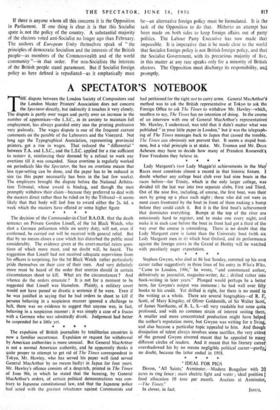Stephen Gwynn, who died at 86 last Sunday, summed up
his own career rather suggestively in three lines of his entry in Who's Who.
"Came to London, 1906," he wrote, " and commenced author, definitively as journalist, magazine-writer, &c. ; drifted rather into book-writing in later years." Plunged would perhaps be a bettet' term, for Gwynn's output was immense ; he had well over fifty,
books to his credit. Yet drifted is right, for there is no motif in the writing as a whole. There are several biographies—of R. Pi, Scott, of Mary Kingsley, of Oliver Goldsmith, of Sir Walter Scott, of James Northcote, of R.. L. S.—all very readable but none quite), profound, and with no common strain of interest uniting them A smaller and more concentrated production might have helpe4 the author's reputation more, but Gwynn was writing for a living; and also because a particular topic appealed to him. And though dissipation of talent always involves some sacrifice, the very extent of the ground Gwynn Covered meant that he appealed to man different circles of readers. And it meant that his literary caree overshadowed his by no means negligible political career—partly no doubt, because the latter ended in 1918.
* * * *




































 Previous page
Previous page